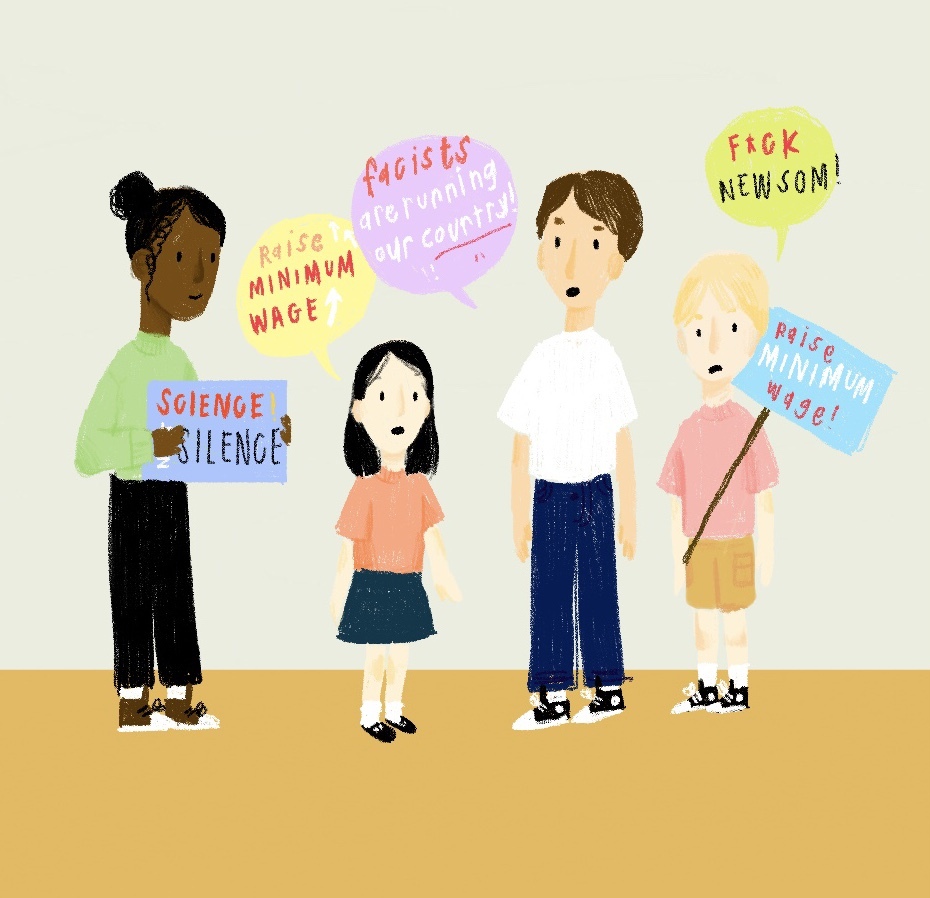Opinion: Free speech or hate speech? We’ll never know!
April 8, 2021

Last weekend, my dad, brother, and I were on our way to Petco when we passed a group of protestors on the side of the road in a big tent with bright red flags that read: “F*ck Newsom.” I glanced over at my 9-year-old brother, whose vision almost met with the flags, and immediately told him to look away, avoiding a conversation that he shouldn’t be having yet.
Is this really ok?
The first amendment states that “Congress shall make no law respecting an establishment of religion, or prohibiting the free exercise thereof; or abridging the freedom of speech, or of the press or the right of the people peaceably to assemble; and to petition the government for a redress of grievances.”
Even so, I couldn’t help but think to myself, shouldn’t there be some restrictions for this use of foul language in an area that all people, including my 9-year-old brother, could see?
The answer is complicated. I’ve thought about this quite a bit. We can’t simply draw a solid line that fails to consider the nuance of each circumstance.
Speech is subjective. Every circumstance in which it is employed is different from the next; therefore, drawing a solid line that separates what we can say versus what we can’t is impossible. It leaves a ubiquitous area of grey.
There are many things that are said, not only in protests but in daily life that can fit under a broad category of being “inappropriate.” For the most part, we overlook them and forget that there are inherent guidelines that set the moral standards for what we can say, which then again varies per person since all people don’t agree on a single set of moral standards.
Speech occurs and is defined by countless works and actions from oral, written, and body expression. Due to the many ways we express this freedom, there is conflict to what should be protected and not.
Legally, there is no law that can punish those who utilize derogatory or foul language in any form of speech expression.
According to The First Amendment Encyclopedia, the section on Profanity by David L. Hudson Jr. states that “the usage of profanity has historically been considered punishable.” However, he also points out that, “the Court ruled that profanity can not be banned under the First Amendment,” in Cohen v. California (1971).
Given that we have the legal right to profane speech, it makes it even more complicated to siphon what is considered “right” or “wrong” to say. What’s legal isn’t always right and what’s wrong isn’t always illegal so it can be hard to view the law a clear decider of what’s right or wrong
Speech in protests can vary from peaceful to violent depending on the situation and what they’re fighting for. What is legal and illegal to say restricts their cause and instigates conflict between the people and the law.
With my incident mentioned earlier, protests are used to get a point out and to be heard and freedom of speech is pivotal and a core factor is making it all happen, However, the speech they use can sometimes be conflicting as some use inappropriate speech, which is not illegal but is not appropriate usage of that freedom of speech
In the 1969 Supreme Court case of Tinker vs. Des Moines, the action of the Tinkers pointed out how freedom of speech, in this case in the form of expression, paved the way for more rights in protests. There needs to be as well an adjustment in the lens to which we see the boundaries of free speech.
The case points out that punishable expression of speech is not always considered bad by other people
U.S. citizens have the right to protest and must certainly exercise the right to do so. However, there are, again, certain limitations but in the means of still being able to express ourselves
Again protests may use aggressive speech in getting their message out and sometimes use foul language. The Supreme Court declared in the case Schenck v. the United States in 1919 that we aren’t privileged to say anything that can be a danger to society.
In addition, in the case of Brandenburg v. Ohio 1969, the court made it so that racist speech should be protected unless it causes imminent violence
So clearly sometimes the things we say as jokes or remarks that some may find offensive are not illegal and not punishable by the law, in the circumstance in which we don’t cause violence.
To draw the line of speech while as individuals may say inappropriate and vulgar terms within our close friends or alone and not really in the open at a protest must take into consideration the language they themselves use or it could prove hypocritical
Also taking into consideration that the remarks are supposed to be taken lightly as opposed to protests which are meant to be taken seriously. These exceptions make it even harder to draw a clear line on what is right to say
Since times are changing as well in terms of moral standards, there are more expectations and rules of society that free speech has to adapt to and the reality is that there will be things you say that people will not like and vice versa.
You can’t deny, however, that freedom of speech is important to everyone in this country, as it allows us to advocate and have our voices heard without punishment.
You can’t deny either that as civilized and sensible beings, we should proceed with caution in how we express our speech and be aware of others as well.
Taking into consideration and how there will always be exceptions to where a line is drawn of what’s ok and not okay to say, there will never be a clear, straight line to draw.
There are some things you can do to be more mindful during situations that involve speech and remain neutral.
Think about what message you’re trying to get out, who will see it, and if you’re expressing your right of speech in an appropriate way that is considerate to society.
It’s okay that there’s no clear divider on what we are allowed to say. Free speech is a very complex thing with all its rules and boundaries.
We as humans are capable of deciphering for ourselves what we think is right and wrong to say. In protest, we must exercise our free speech but at the same time, not abuse our right of the First Amendment and watch what we say.


